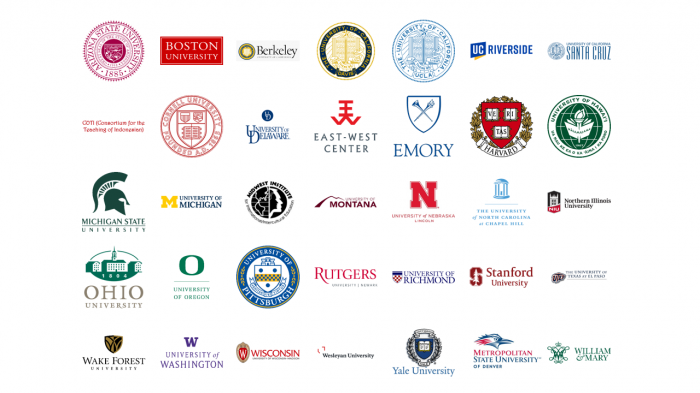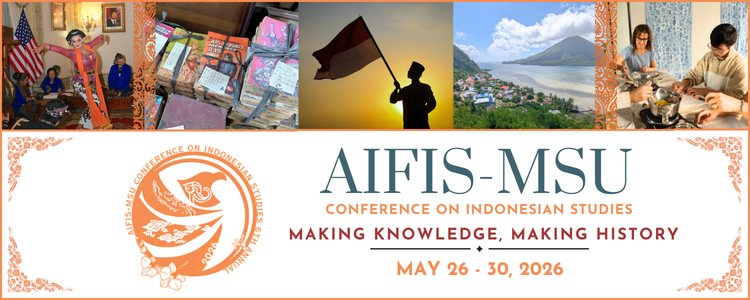
The American Institute for Indonesian Studies (AIFIS) and Michigan State University (MSU) Asian Studies Center will convene the 6th annual AIFIS-MSU Conference on Indonesian Studies from May 26-30, 2026. Presented in a bilingual and virtual format, the conference is designed to bring together scholars working across geographic and disciplinary frameworks to explore the evolving field of area studies research in Indonesia.
This year’s conference theme, “Making Knowledge, Making History: Producing the Indonesian Past, Present and Future,” invites scholars, students, artists, and practitioners to explore how Indonesia has been imagined, studied, and narrated across time. Knowledge and history are never neutral–they are made, remade, and contested through the shifting dynamics of power, place, and perspective. We seek to open a space for critical reflection on how diverse disciplines of studying Indonesia have been constructed: by whom, for whom, and to what ends. From colonial archives to digital media, from indigenous epistemologies to regional and global scholarship, the production of knowledge about Indonesia reveals enduring tensions between authority and agency, memory and forgetting, locality and universality. How have academic disciplines, state institutions, and communities contributed to the shaping of Indonesia’s intellectual landscapes? How might alternative ways of knowing—oral traditions, government databases, visual cultures, statistical analyses, performative practices, activist archives, or legal discourse—challenge established narratives and foreshadow new futures
We welcome papers and presentations from across disciplines and subjects, including but not limited to:
Proposals for panels and presentations engaging with this theme or on any other theme focusing on Indonesia and its place in the world are welcomed. Abstracts are accepted in Indonesian and English.
Abstracts are accepted in Indonesian and English.
*All speakers must register to attend the conference.
Organized Panel Session (Group Submission): A group of presenters may propose a panel session of 3 or 4 separate paper presentations based on work that shares a set of common themes, issues, or research questions. The panel sessions are 90 minutes long and panel organizers must identify a chair and a discussant in the proposal submission. (300 word panel abstract + 300 word abstract for each individual paper)
Roundtable Session (Group Submission): Intended to foster connections and substantive exchanges among a community of researchers and practitioners on a collaborative project, or a particular issue with implications on research and policy. The roundtable sessions are 90 minutes long and feature up to 4 presentations on the roundtable topic. As such, the presentations do not have individual separate titles. Roundtable organizers should identify a chair who will moderate the discussion. (300 word abstract, identifying key speakers and their field areas and institutional affiliations)
Book Talks (Group Submission): For this new category of submissions we invite groups of scholars to discuss recently published books. The panel should ideally feature a single book as the focus of conversation, taking the conversation beyond single author presentations by bringing together a group of scholars to foster dialogue about method, field and public engagement. We are open to creative arrangements for these panels but should include 3-4 speakers and represent a diversity of perspectives on the subject of the book being presented. Each speaker should submit a short 300 word abstract reflecting how they plan to discuss the book subject from their respective fields. (300 word book abstract + 300 word abstract for each speaker).
Paper Presentation (Individual/Co-authored Submission): Individuals and co-authors (maximum two speakers) are invited to submit abstracts for paper presentations. Each paper presentation is given a 15-minute time allotment. Each person may submit only one paper abstract. For co-authored works, a maximum of two speakers are allowed to present and have their names listed within a single paper presentation. Additional authors (if any) are welcome to attend the conference if they register as regular attendees, and only the two main speakers will be listed in the program and receive presentation certificates (300 word abstract).
Proposals are welcomed from scholars across the entire field of Indonesian Studies, regardless of their academic affiliation, with particular encouragement for those from academic communities that are underrepresented in international forums. One of the key goals of the AIFIS-MSU Conference on Indonesia is to facilitate interdisciplinary dialogue and scholarly exchanges that transcend the typical boundaries of academic networks. Indonesian and English bilingualism is welcomed across the conference, and panel and roundtable submissions with diverse participation in terms of gender, academic rank, national origin, and disciplinary approach are strongly encouraged.
REGISTRATION OPENS March 2026
Registration is required for all participants. We have intentionally kept the cost of the conference low to aid in greater access, but will welcome anyone regardless of finances. Please contact the organizers directly to discuss need based access to the conference.
US & International participants:
Annual income below US$ 75,000: $35.00 USD
Annual income US$ 75,000 and above: $60.00 USD
LMIC-based participants US $17.25
Register and complete the registration fee payment using any major credit card directly on the Virtual Conference Platform (on Whova).
Indonesia-based participants:
Option 1: Pre-Register and complete registration payment via direct electronic bank transfer. The Conference Organizers will then send instructions on how to complete the full registration on the conference platform.
OR
Option 2: Register and complete the registration fee payment using any major credit card on the conference platform.
For more information about the AIFIS-MSU Conference on Indonesian Studies, contact:
American Institute for Indonesian Studies (AIFIS)
The American Institute for Indonesian Studies (AIFIS) is a non-profit (501c3) educational organization incorporated in the United States. It was established with the generous financial support of The Henry Luce Foundation, the U.S. Department of Education and the Department of State, Bureau of Educational and Cultural Affairs in the United States, and the Putera Sampoerna Foundation in Indonesia. AIFIS is a consortium of American universities and colleges that have expressed a keen interest in furthering the development of Indonesian studies in the United States. Its main goals are to foster scholarly exchange between Indonesian and U.S. scholars, promote educational and research efforts by U.S. scholars in Indonesia, and facilitate visits by Indonesian scholars to the United States.
Email:
Website: aifis.org
Michigan State University Asian Studies Center
The Asian Studies Center at Michigan State University directs one of the largest, most diverse programs of education about Asia in the Midwest. Unlike other programs, the Center is distinguished by its approach to East, Central, North, West, South, and Southeast Asia in the design of its curriculum, focus on faculty research, and outreach activities. Presently, the Center’s 250+ affiliated faculty members represent 41 academic departments in all of MSU's 17 colleges.
Email:
Website: asia.isp.msu.edu
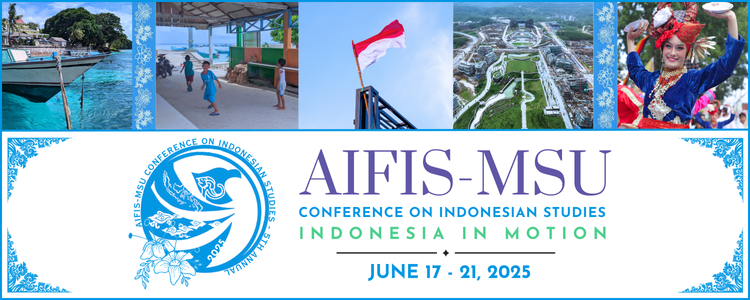
The American Institute for Indonesian Studies (AIFIS), in collaboration with Michigan State University (MSU) Asian Studies Center, will hold the 5th annual AIFIS-MSU Conference on Indonesian Studies from June 17 - 21, 2025.
Celebrating the growing and evolving academic study of Indonesia, the conference aims to expand research dissemination and collaboration by connecting Indonesian scholars with international colleagues in a bilingual and virtual format.
“Indonesia in Motion: Aspirations and Apprehensions”
This year’s conference explores the theme “Indonesia in Motion: Aspirations and Apprehensions” to examine the intersections of precarity, resilience, and transformation in Indonesia and beyond. Building from last year’s focus on Indonesia’s global ascendance, our theme this year highlights uncertainties prompted by emerging trends in all aspects of life in Indonesia, past, present, and future. The conference considers the shared hopes and anxieties shaping the experiences of Indonesian and global communities.
Central to this year’s theme is the duality of volatility and potential for change. We highlight national and local, formal and informal institutional initiatives aimed at fostering resilience and ensuring the well being of Indonesia and the Indonesian people. Through interdisciplinary conversations, the conference seeks to illuminate pathways forward, emphasizing collective action and shared resources to navigate an era of uncertainty. Join us as we reflect on the tensions and possibilities of a world in motion and envision futures shaped by both aspiration and apprehension. Proposals for panels and presentations engaging with this theme or on any other theme focusing on Indonesia and its place in the world are welcomed. Abstracts are accepted in Indonesian and English.
CLICK HERE TO VIEW or DOWNLOAD THE CONFERENCE PDF PROGRAM
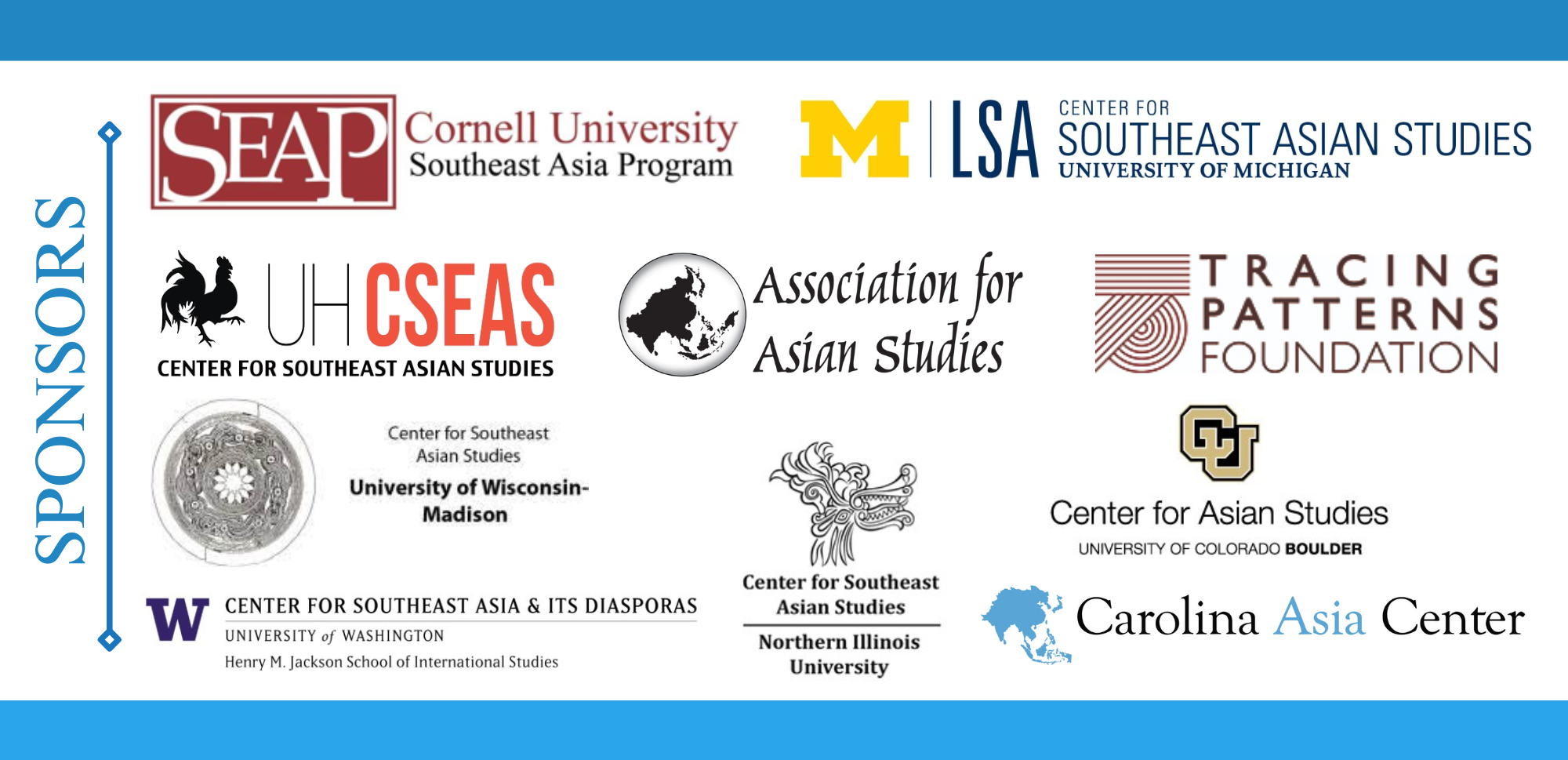
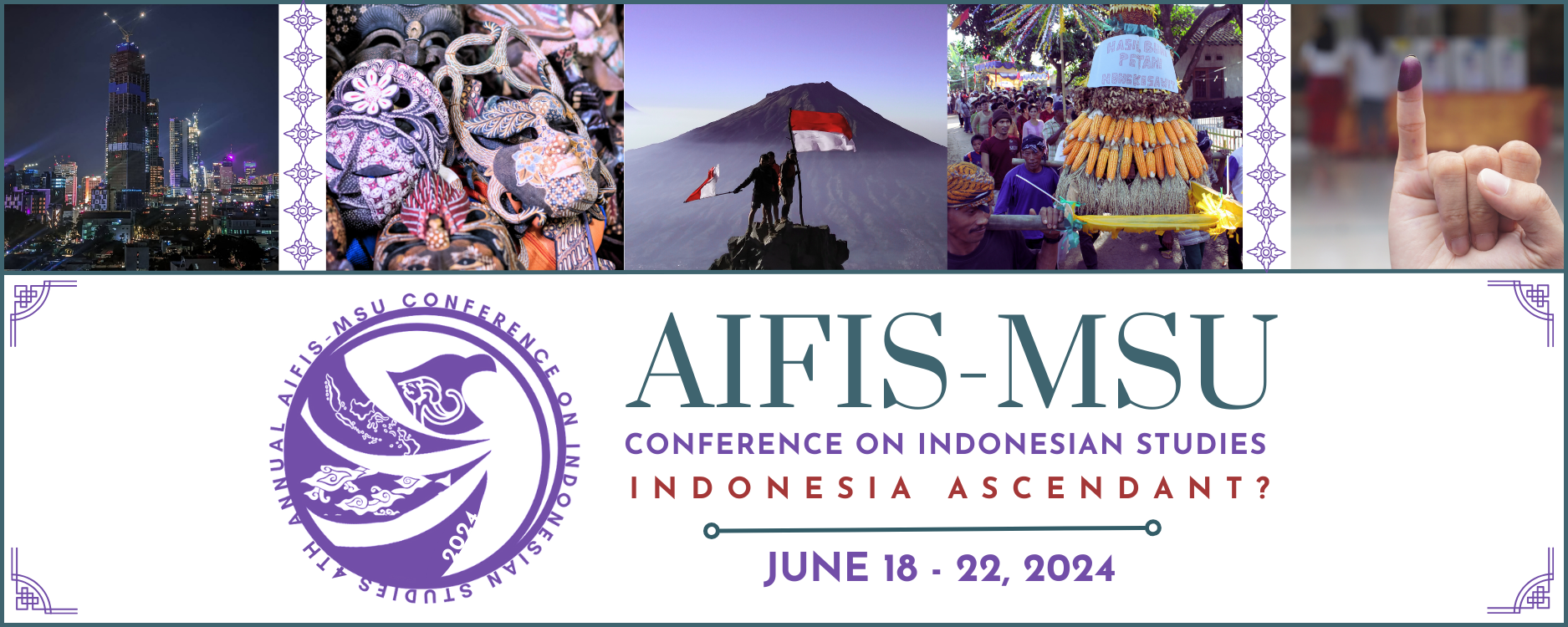
The American Institute for Indonesian Studies (AIFIS), in collaboration with Michigan State University (MSU) Asian Studies Center, held the 4th annual AIFIS-MSU Conference on Indonesian Studies from June 18 - 22, 2024.
The conference highlighted and celebrated the growing and evolving academic study of Indonesia. The conference aimed to expand research dissemination and collaboration by connecting Indonesian scholars with international colleagues in a bilingual and virtual format.
Indonesia Ascendant?
Indonesia experienced a kind of ascendance on the global stage that drew a lot of attention and interest. Notably, Indonesia’s success stood out compared to other contexts as the nation continued to be a global exemplar of religious pluralism and democracy. And yet, there was a sense of the Indonesian project being somehow “unfinished,” stuck, or backsliding in some ways. What progress (kemajuan) had been made, and how did we know? In environmental management, Indonesia was either on the cusp of fulfilling great opportunity as a leader in global climate change or of resource degradation and collapse. Inspired images of the plan to construct a national eco-capital city, Nusantara, symbolized Indonesia’s sustainable future but contrasted with the continued dependence on resource extraction evident from the many coal barges pummeling past the banks of the Mahakam river.
A discourse of Indonesia’s ascendance suggested there was great change on the horizon: hopes for a just transition of power, improvements in the downstream impact of governance and policy (hilirisasi), decreased forms of digital authoritarianism and legal discrimination, sustainable development achievements, an expanded role for women across professions and in public life, and strengthened relationships between civil society and the state. There was a great sense of creative energy within Indonesia, and as a by-product, within Indonesian Studies. Poverty pressed with genius, a landscape in which people were emboldened to assemble things together in new ways, not just as a means of survival but as a reflection of innovation and resilience.
The program committee invited abstract submissions from scholars across broad disciplinary perspectives in the study of Indonesia. While abstracts on any topic focusing on Indonesia were welcome, the committee was especially interested in research that engaged discourses on the trajectory of Indonesia, past and present, and broadly defined.
The AIFIS-MSU Conference was proud to partner with the Museum Batik Indonesia, the Directorate General of Culture, the Ministry of Education, Culture, Research, and Technology of the Republic of Indonesia. All motifs throughout the 2024 conference program were graciously gifted by the Museum Batik Indonesia.


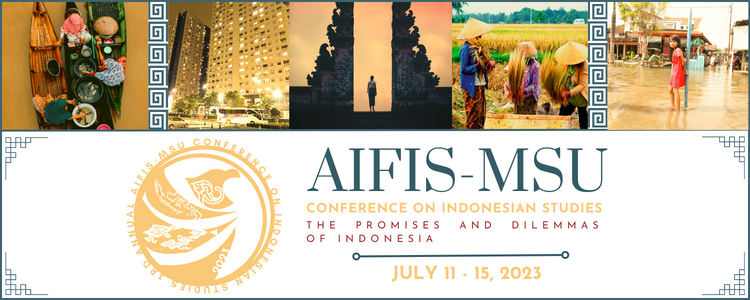
In its third iteration in 2023, the AIFIS-MSU Conference on Indonesian Studies continues to highlight and celebrate the growing and evolving academic study of Indonesia. The conference aims to expand research dissemination and collaboration by connecting Indonesian scholars with international colleagues in a bilingual and virtual format.
This year’s conference theme, “The Promises and Dilemmas of Indonesia,” seeks to inspire reflection on Indonesia’s successes, discontents, and efforts to rework, reinterpret, and negotiate all aspects of civic, legal, and cultural living, against and in light of Indonesia’s internal fractures and frictions and its important profile and positionality globally and in the Asia-Pacific region. The conference seeks to explore and investigate a broad range of topics, including kebangsaan, in its diverse and competing meanings, adat and law, gender and race, environment and climate change, business, politics, and religion, and Indonesia’s place in the world. Indonesia continues to grapple with internal tensions and regresses as she also reaps the rewards of developmental leaps and resilience amidst global uncertainties and adverse challenges from the impacts of the COVID-19 pandemic, shifting geopolitical relations, and economic volatility.
The Conference Program Committee selected a multidimensional theme for our conference, one which is at once capacious enough to welcome and allow for an array of scholars working in/on/from Indonesia to reflect the specificity of Indonesian Studies in our current global climate. We encourage scholars to present research and reflections on the ways scholars of Indonesia historicize the country’s past, navigate current times, and explore imaginative futures and possibilities, all while contributing to the richness of the community’s collective legal and ethical-epistemological frameworks.
The deadline for abstract submission passed on April 17. The committee will notify selected participants after May 17.
Registration is required for all participants. We have intentionally kept the cost of the conference low to aid in greater access, but will welcome anyone regardless of finances. Please contact the organizers directly to discuss need based access to the conference.

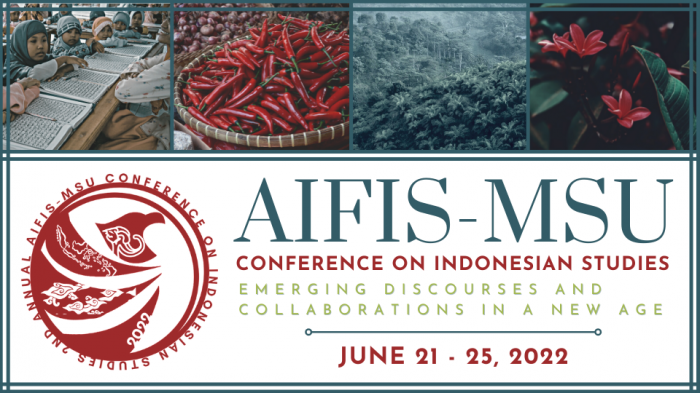
The American Institute for Indonesian Studies (AIFIS), in collaboration with Michigan State University (MSU) Asian Studies Center, will hold the 2nd annual Conference on Indonesian Studies from June 21 - 25, 2022. The Conference celebrates the academic study of Indonesia. It seeks to expand research dissemination and collaboration on Indonesian studies by connecting Indonesian scholars with international colleagues in a bilingual and virtual format.
The 2022 AIFIS-MSU Conference on Indonesian Studies welcomes scholars with academic backgrounds and research expertise in history, culture, anthropology, sociology, language, and arts, and those advancing understandings of the ways that historical, sociocultural, economic, and political contexts shape contemporary and historical issues in Indonesia.
Conference Theme: Emerging Discourses and Collaborations in a New Age
This year’s theme draws attention to the importance of transnational dialogue as we work in concert to advance research on Indonesia amidst great global challenges. The pandemic has brought heightened awareness of our global interconnections and transformed the ways in which we engage in scholarship and collaborate with each other.
The AIFIS-MSU Conference on Indonesian Studies is borne out of our process of evolving and transforming, enabling expanded ability to connect and collaborate across our geographical divide, and to engage in a range of conversations with a greater diversity of individuals, communities, and institutions. It is in this spirit of kerja sama // collaboration and discourse building that we welcome paper proposals from Indonesianists across disciplines.
Conference Institutional Partners within the AIFIS Consortium
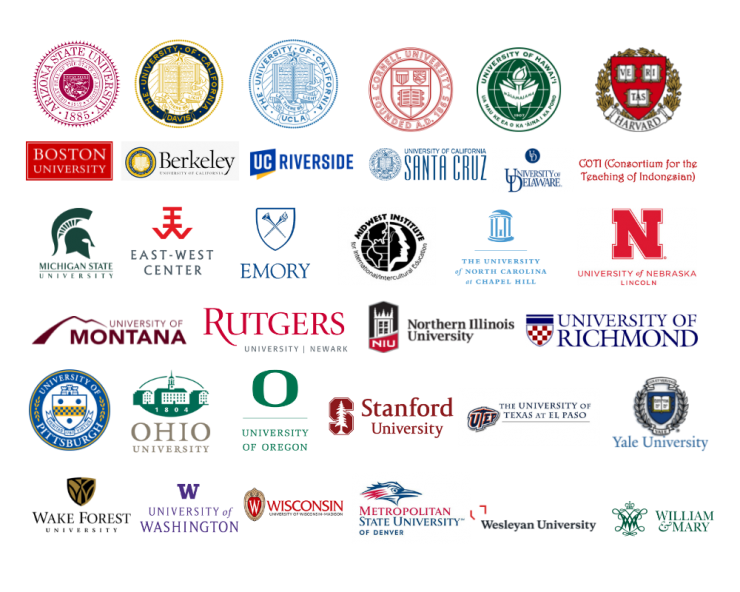
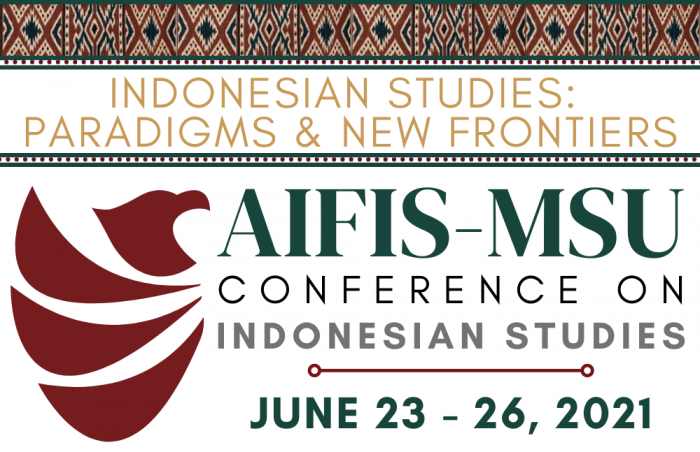
Conference Theme: Paradigms and New Frontiers
Dates: June 23 - 26, 2021
Programs:
WIB Program
EDT Program
The academic study of what is now referred to as Indonesia has several long, interwoven, and at times troubling, histories. What was once an area of inquiry borne from colonial curiosities and necessities has transformed into a broad, multi-disciplinary effort by Western and Indonesian scholars alike to better understand the archipelago's historical, cultural, linguistic, literary, artistic, economic, environmental, and political dimensions, as well as its role in the Indo-Pacific and the world.
The AIFIS-MSU inaugural bilingual conference on Indonesian studies celebrates the academic study of Indonesia and connects Indonesian scholars with Western colleagues. In this spirit of mutual intellectual inquiry, we welcome Indonesianists across disciplines to share their research, consider the state of our field, and to help to chart its future.
Keynote Speakers:
Professor AquArini Priyatna, Universitas Padjadjaran, Indonesia
Keynote Address: Writing Women, Women Writing: Feminist Voice in Indonesian Literature
Professor Donald K. Emerson, Stanford University
Scholarship, Autonomy, and Purpose: Issues in Indonesian Studies
Program Committee:
Planning Committee:
Conference Institutional Partners within the AIFIS Consortium
